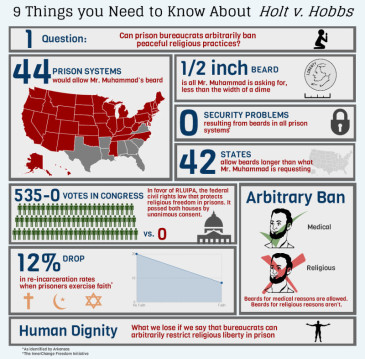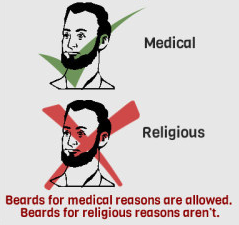Guest post by Daniel Bennett
The Supreme Court is set to take on a hair-razing case.
In October, the Court will hear oral arguments in Holt v. Hobbs. At issue is whether a prison can prohibit an inmate from growing a half-inch beard in accordance with his faith.

Becket Fund for Religious Liberty’s Holt v Hobbs info-graphic. Becket Fund is representing the prisoner, Gregory Holt, in this case.
Since 2011, Gregory Holt, an adherent of Salafi Islam, has sought an exemption to an Arkansas prison regulation barring facial hair. The prison cites the importance of uniform appearances among inmates, hygiene issues, and safety concerns in maintaining its ban on beards. Holt argues that Arkansas’ ban is not absolute. The state allows beards for medical reasons. So, why not for religious reasons, too?
After being denied in federal district court and the Eighth Circuit Court of Appeals, Holt submitted a handwritten appeal to Justice Samuel Alito, who oversees appeals from that circuit. Alito brought the appeal to the full Supreme Court, who voted to hear the case in May.
It is rare for appeals like Holt’s (in legalese: in forma pauperis) to be granted. In 2010, the Court heard less than 0.25 percent of such appeals (not 25 percent—0.25 percent, or one-in-400).
The prisoner’s defense team comes from the Becket Fund for Religious Liberty. The Becket Fund was also the legal force behind this year’s landmark Hobby Lobby case. In this case, the Becket Fund contends that the prison’s policy runs afoul of the federal Religious Land Use and Institutionalized Persons Act (RLUIPA), a follow-up to the Religious Freedom Restoration Act (cited heavily in the Hobby Lobby case). Becket also argues that since the prison allows beards for medical reasons, the decision to refuse Holt’s religious request is arbitrary, and therefore unacceptable.
Based on the details of this case and past precedent, it should surprise nobody to see a decision in Holt’s favor. In 2005’s Cutter v. Wilkinson, the Court unanimously held that RLUIPA requires prisons accepting federal money to make reasonable accommodations for inmates’ religious practices. In this case, the prison may have trouble convincing the justices that a half-inch beard is unreasonable, particularly since it allows beards for some prisoners already.
It therefore appears that Holt v. Hobbs will finally give us an answer to that age-old question: do you have a religious right to your beard? The Court seems favorable to this type of case, and its willingness to even hear the case suggests that it wants to rule for Holt. Expect the Court to say that you have a religious right to grow a beard — at least if you’re incarcerated in a prison that accepts federal funding.
Daniel Bennett, PhD, researches the conservative legal movement. He is an assistant professor of political science at Eastern Kentucky University. You can follow him on twitter at @BennettDaniel.
Don’t miss any more posts from the Corner of Church & State. Click the red subscribe button in the right hand column. Follow @TobinGrant on Twitter and on the Corner of Church & State Facebook page.





